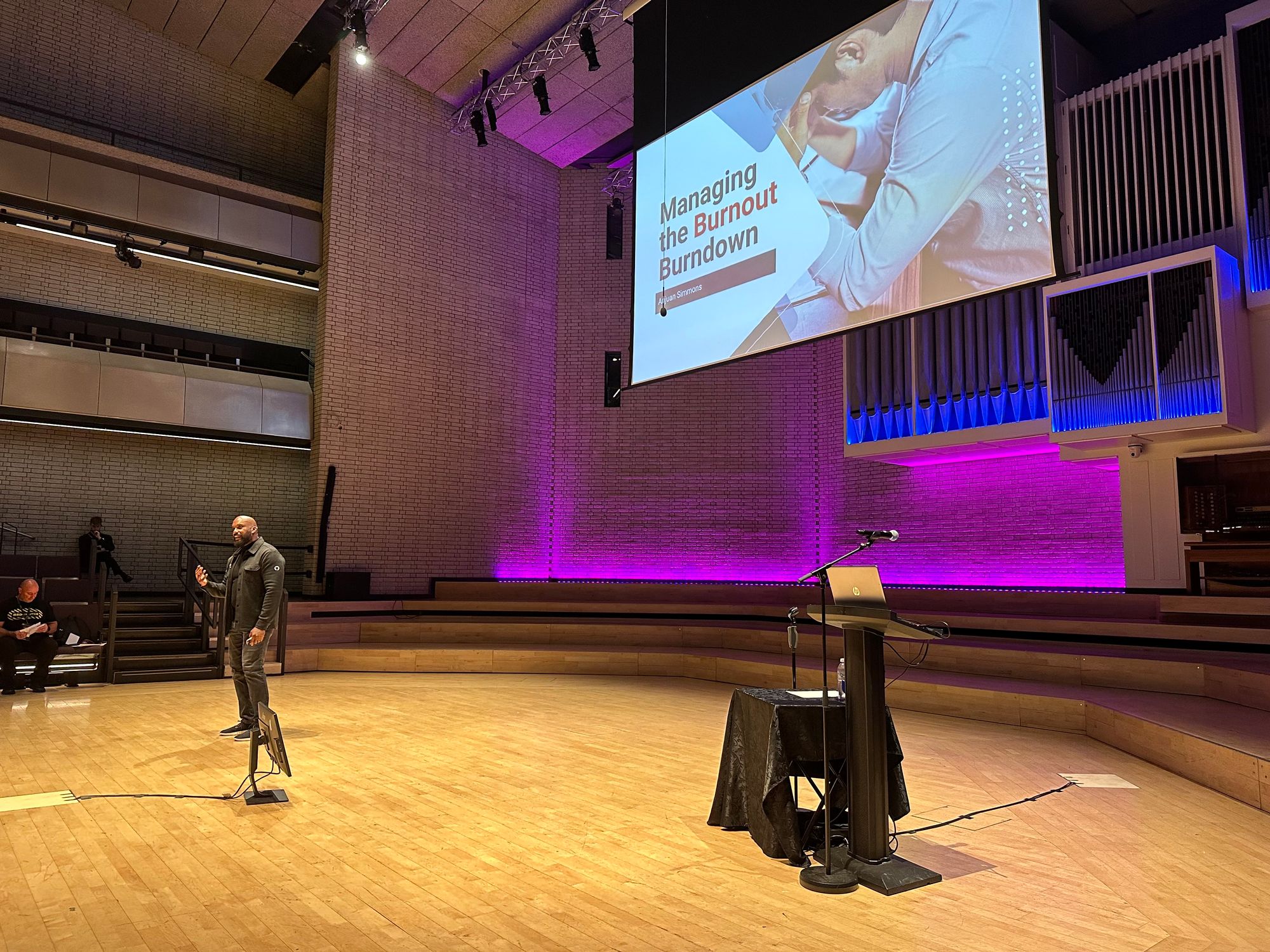Managing the Burnout Burndown @ MCR DevCon 2023


It was an inspiring day at the MCR DevCon, an event showcasing the brightest minds in the tech world, providing an enriching platform for attendees to learn, share, and innovate. Among the various influential speakers, one standout presentation was from Anjuan Simmons, an Engineering Manager at Github and a renowned industry thought leader.
For those unfamiliar with his work, Anjuan brings to the table a rich amalgam of experience in software development and team management. His extensive career includes time at esteemed companies like IBM, Deloitte, and Accenture. He's also an influential voice in the technology and project management sphere, with numerous articles and talks credited to his name. Anjuan's multifaceted expertise, combined with his unique perspective on navigating the complexities of the tech industry, made him an anticipated speaker at the event.
His presentation, aptly titled "Managing the Burnout Burndown", was a deep-dive into an all-too-common yet often underestimated issue - burnout. Simmons addressed this pervasive problem with a blend of empathetic understanding and strategic insight.
Anjuan delved into how people in tech are often dismissed when they voice feelings of exhaustion from their work. The mental toll of continuously keeping up with the latest trends, constantly shipping, and being perpetually "on" is sometimes underestimated, especially when compared to jobs involving physical labour. He illustrated this with a memorable quote, "Anything that is always on will fail," stressing its applicability to both software and humans.
Stress, as Anjuan articulated, can manifest in myriad ways, such as seeking escape through time off or even quitting one's job. He further drove his point home with an analogy to Agile project management, drawing parallels with the burndown chart, a tool used to track work completed over time.

He argued that aiming for the 'ideal' line on this chart isn't just unrealistic; it's unsustainable. The path to productivity isn't linear—it ebbs and flows with internal and external factors. His proposed solution? Building healthy teams that support each other in navigating these highs and lows.
Exploring the manifestations of burnout, Simmons outlined three key signs:
- Emotional Exhaustion: The state of being unable to give any more of oneself to the work at hand.
- Depersonalisation: Feeling treated as a resource rather than a person or perceiving others as trying to sabotage one's work.
- Reduced Personal Accomplishment: A lack of celebration for successes and a sense of underachievement.
Anjuan provided further gravity to his talk with alarming statistics. He revealed that 23% of people often or always feel burned out at work, 44% sometimes, and an astounding $190 billion is spent annually on stress-related issues. He stressed that burnout not only affects mental health but can also lead to severe physical health issues.
He critiqued companies that attempt to solve burnout by offering superficial perks, such as free food or games rooms. These, he argued, only mask the underlying issues and are usually the first to go when companies face financial strain. He also cautioned against escapism, such as long vacations, which only provide temporary relief from persisting issues.
In the wake of these issues, he introduced the 'Burnout Resistance Framework,' drawing an analogy to a server's functioning. This framework included:
- Limiting Distractions: Reducing time spent on attention-diverting activities like social media.
- Harnessing Attention: Focusing on one task at a time and avoiding multitasking, as detailed in the recommended book "Deep Work" by Cal Newport.
- Learning to say "no": Politely refusing tasks that one realistically doesn't have the capacity for.
- Finding Alternatives: Seeking out different solutions that save time while delivering value.

Anjuan wrapped up his insightful session by touching upon the critical role of relationships in resilience. He acknowledged the reduced interaction due to remote work and the isolation it can cause, reminding us all that maintaining relationships even in a remote setting is vital for our well-being.
